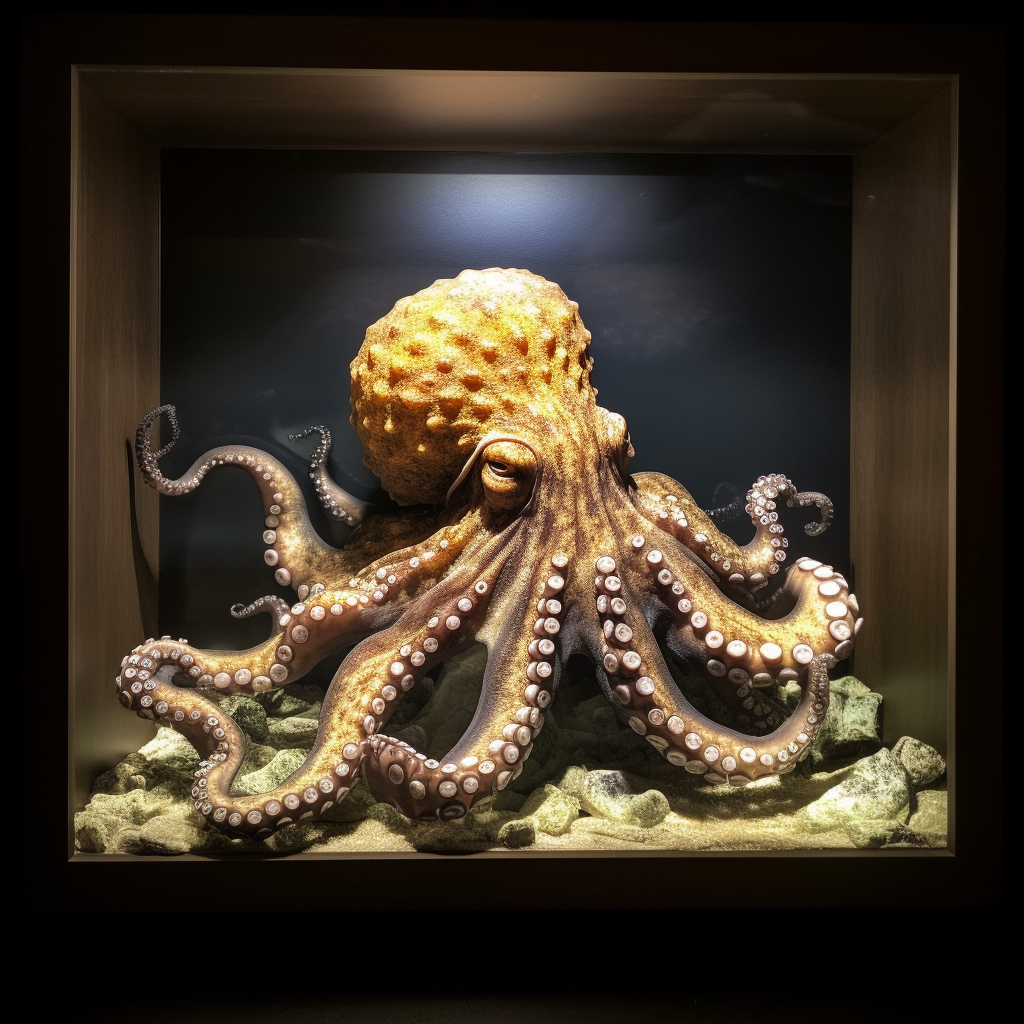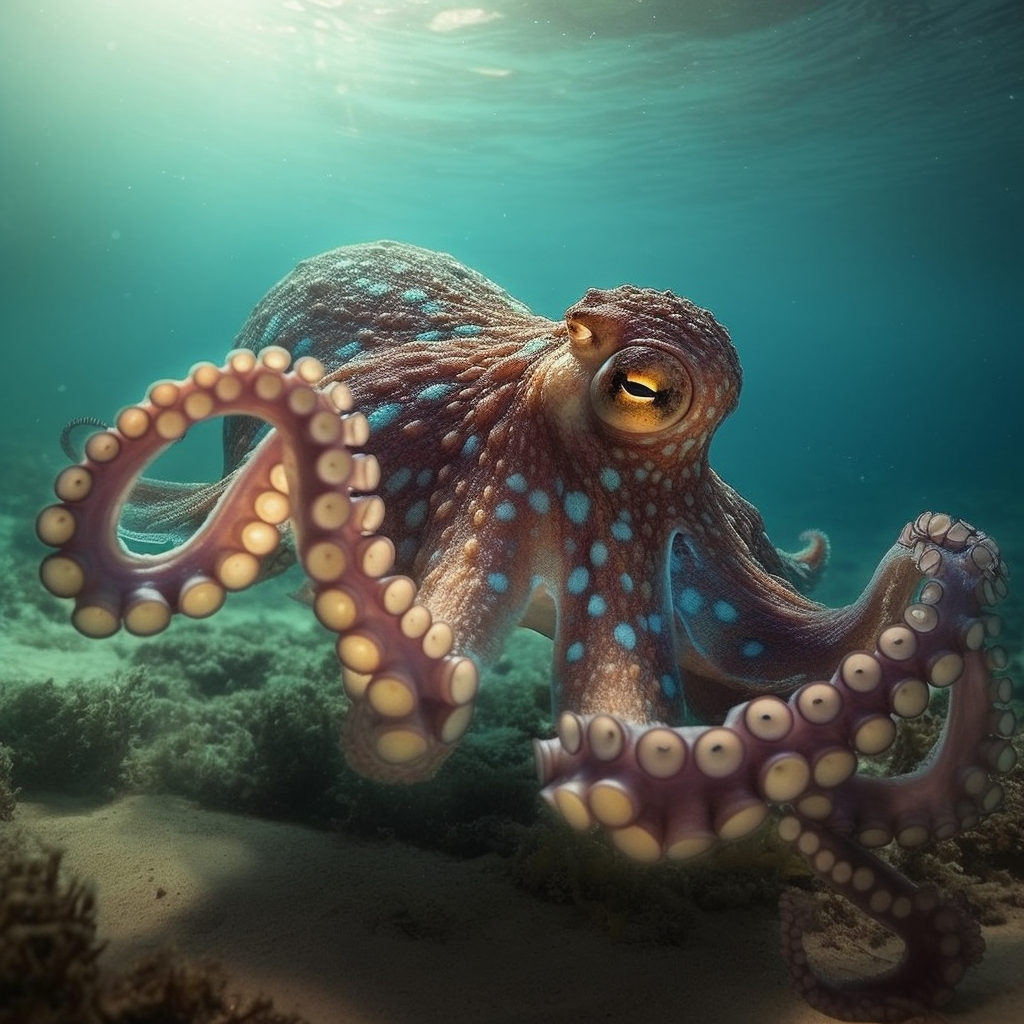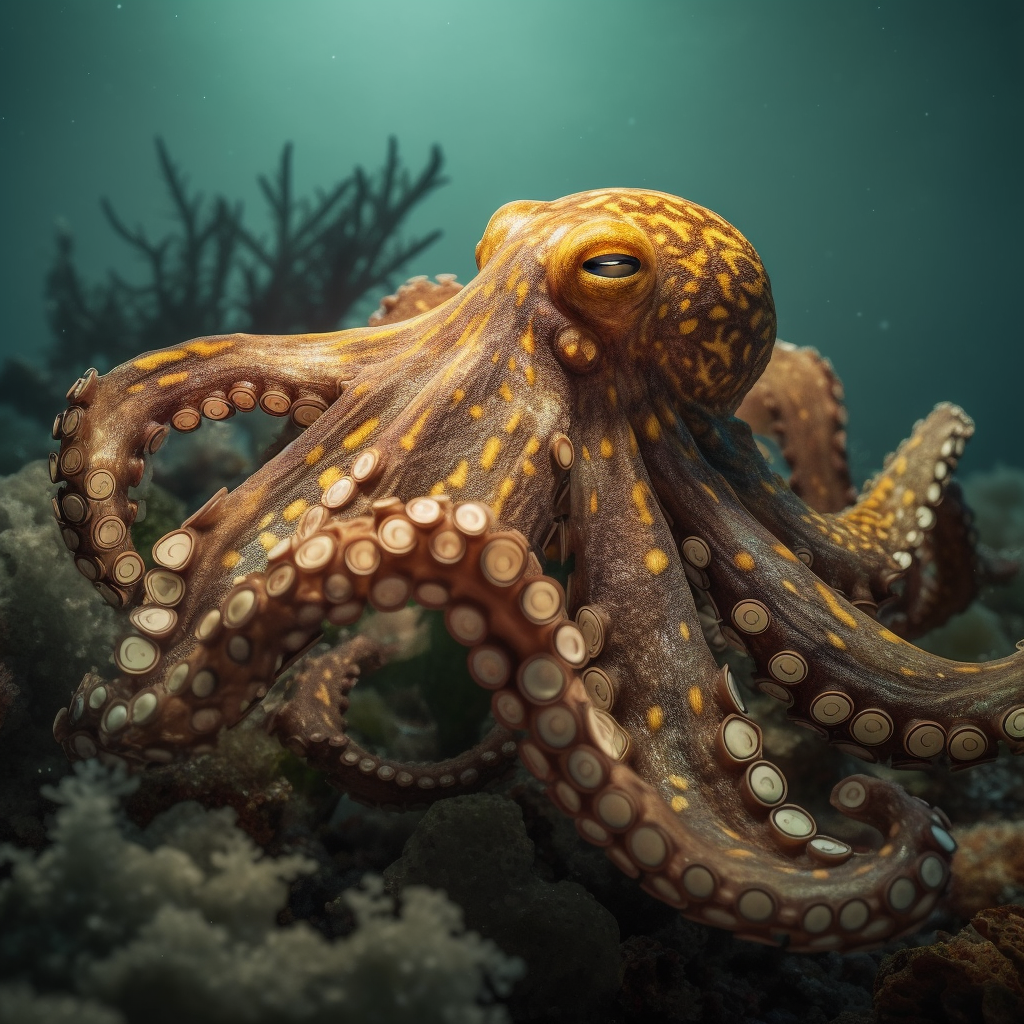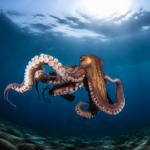Octopuses are fascinating creatures that have captivated the curiosity of scientists and the general public alike. With their unique appearance, intelligence, and complex behaviors, many wonder if octopuses possess self-awareness. Self-awareness is the ability to recognize oneself as an individual separate from the environment and other beings. While self-awareness has long been considered a trait exclusive to humans, recent research suggests that octopuses may also possess this cognitive ability. In this article, we will explore the question of whether octopuses are self-aware, examining the evidence from scientific studies and shedding light on the fascinating world of these enigmatic creatures. So, let’s dive in and unravel the mysteries of octopus self-awareness.
Key Takeaways
- The question of whether octopuses are self-aware is still a topic of debate among scientists.
- Octopuses exhibit complex behaviors and problem-solving abilities, suggesting a level of self-awareness.
- However, more research is needed to fully understand the extent of octopus consciousness and self-awareness.
The Fascinating World of Octopuses: An Overview
A. The Unique Biology of Octopuses
Octopuses are truly remarkable creatures that inhabit the world’s oceans. With their distinctive appearance and incredible abilities, they have captivated the curiosity of scientists and nature enthusiasts alike. Let’s delve into the unique biology of these fascinating creatures.
1. Adaptations for Survival
Octopuses have evolved a range of adaptations that allow them to thrive in their marine environments. One of their most remarkable features is their ability to change color and texture, enabling them to blend seamlessly into their surroundings. This remarkable camouflage helps them avoid predators and surprise their prey.
In addition to their camouflage abilities, octopuses have a soft body with no internal or external skeleton. This flexibility allows them to squeeze through tight spaces and escape from predators. They also possess a beak-like mouth, which they use to crack open shells and feed on crustaceans.
2. Complex Nervous System
Octopuses possess a highly developed nervous system, which contributes to their remarkable cognitive abilities. Their brain is distributed throughout their body, with a large portion located in their arms. This decentralized structure allows for quick and efficient decision-making.
Unlike most other invertebrates, octopuses have a well-developed sense of touch. Their arms are covered in specialized cells called chemoreceptors, which allow them to taste and explore their environment. This heightened sensory perception enables them to navigate their surroundings with precision.
B. The Complex Behavior of Octopuses
Octopuses exhibit a wide range of complex behaviors that showcase their intelligence and adaptability. Let’s explore some of these fascinating behaviors.
1. Problem-Solving Abilities
Octopuses are known for their exceptional problem-solving skills. In laboratory experiments, they have demonstrated the ability to navigate mazes, open jars, and even unscrew lids to access food. These problem-solving abilities highlight their capacity for learning and memory.
2. Tool Use
In addition to their problem-solving skills, octopuses have been observed using tools in the wild. They have been seen collecting coconut shells and using them as portable shelters. This behavior showcases their ability to recognize and utilize objects in their environment to their advantage.
3. Social Interactions
While octopuses are typically solitary creatures, they do engage in social interactions, particularly during mating season. Male octopuses perform elaborate courtship displays to attract females, and they engage in complex behaviors to ensure reproductive success.
4. Camouflage and Mimicry
Octopuses are masters of disguise. They can change their color, texture, and even shape to mimic their surroundings or other marine organisms. This remarkable ability allows them to hide from predators and ambush unsuspecting prey.
In conclusion, octopuses are truly remarkable creatures with unique biology and complex behaviors. Their ability to adapt to their environment, problem-solve, and engage in social interactions showcases their intelligence and cognitive abilities. By studying these fascinating creatures, scientists continue to uncover the mysteries of octopus intelligence and gain insights into the complexity of animal cognition.
Delving into Octopus Intelligence
A. Evidence of Octopus Intelligence
Octopuses are fascinating creatures that have captivated the curiosity of scientists and nature enthusiasts alike. These cephalopods exhibit a remarkable level of intelligence, which is evident in their behavior and cognitive abilities. While the concept of self-awareness in octopuses is still a topic of ongoing research, there is growing evidence to suggest that these creatures possess a level of intelligence that goes beyond mere instinct.
One of the key indicators of octopus intelligence is their problem-solving skills. Octopuses have been observed using tools, such as rocks or coconut shells, to create shelters or defend themselves. This ability to manipulate objects and adapt to their environment demonstrates a level of cognitive flexibility that is typically associated with intelligent beings.
Another intriguing aspect of octopus intelligence is their remarkable ability to camouflage and mimic their surroundings. Octopuses can change the color and texture of their skin to blend seamlessly with their environment, making them virtually invisible to predators and prey. This complex camouflage behavior requires a high level of sensory perception and cognitive processing, further highlighting the intelligence of these creatures.
B. How Do We Measure Octopus Intelligence?
Measuring intelligence in octopuses is a challenging task, as their cognitive abilities differ significantly from those of other animals. Traditional methods used to assess intelligence, such as IQ tests, are not applicable to octopuses due to their unique biology and behavior. However, scientists have devised alternative methods to evaluate octopus intelligence.
One commonly used method is the mirror test, which assesses an animal‘s ability to recognize itself in a mirror. While some animals, such as dolphins and great apes, have demonstrated self-recognition through this test, the results with octopuses have been inconclusive. Octopuses have shown mixed responses to their reflections, sometimes displaying behaviors that suggest self-recognition, while other times showing no interest or aggression towards the mirror.
Another approach to measuring octopus intelligence is through observational studies of their behavior in the wild or in controlled laboratory settings. By observing how octopuses interact with their environment, solve problems, and learn from their experiences, scientists can gain insights into their cognitive abilities and intelligence.
In addition to behavioral studies, researchers also examine the brain structure and neural capabilities of octopuses to understand their cognitive processes. Octopuses have a highly developed nervous system, with a large portion of their neurons located in their arms. This decentralized neural network allows for complex sensory perception and motor control, contributing to their remarkable intelligence.
In conclusion, while the concept of self-awareness in octopuses is still a subject of ongoing research, there is substantial evidence to suggest that these creatures possess a high level of intelligence. Their problem-solving skills, camouflage abilities, and unique biology all point to their cognitive prowess. By employing innovative methods to measure octopus intelligence, scientists continue to unravel the mysteries of these fascinating creatures and gain a deeper understanding of their remarkable cognitive abilities.
Are Octopuses Self-Conscious?

A. Defining Self-Consciousness in Animals
Self-consciousness is a fascinating concept that has long intrigued scientists and philosophers alike. It refers to the ability of an individual to be aware of their own existence and to recognize themselves as separate entities from the surrounding environment. While self-consciousness is commonly associated with humans, researchers have been exploring whether other animals, such as octopuses, possess this cognitive ability.
In order to understand self-consciousness in animals, scientists often turn to the mirror test. This test involves placing a mark on an animal‘s body that is only visible in a mirror reflection. If the animal recognizes the mark as being on their own body and attempts to remove it, it suggests a level of self-awareness. However, it is important to note that the mirror test is not the only indicator of self-consciousness and may not be applicable to all species.
B. Indications of Self-Consciousness in Octopuses
Octopuses, with their complex behaviors and remarkable intelligence, have become a subject of great interest in the study of animal cognition. While they may not pass the mirror test, there are indications that octopuses possess a form of self-consciousness.
One such indication is their ability to solve problems and exhibit flexible behavior. Octopuses have been observed using tools, such as coconut shells, to create shelters or to protect themselves. This demonstrates their ability to plan and think ahead, suggesting a level of self-awareness.
Another intriguing aspect of octopus behavior is their remarkable camouflage and mimicry skills. Octopuses can change the color and texture of their skin to blend seamlessly with their surroundings, allowing them to hide from predators or ambush prey. This ability requires a high level of self-awareness, as the octopus must be able to perceive its own appearance and adjust it accordingly.
Furthermore, octopuses have been observed displaying distinct personalities and individual preferences. Some octopuses are more curious and exploratory, while others are more cautious and shy. This suggests a level of self-awareness and the ability to make choices based on personal preferences.
While the research on octopus self-consciousness is still ongoing, these behavioral observations provide intriguing insights into the cognitive abilities of these fascinating creatures. Octopuses may not possess the same form of self-consciousness as humans, but they exhibit complex behaviors and cognitive abilities that hint at a level of self-awareness.
In conclusion, the question of whether octopuses are self-conscious beings is a complex one. While they may not pass the mirror test, their problem-solving abilities, camouflage skills, and individual personalities suggest a level of self-awareness. Further research is needed to fully understand the extent of octopus cognition and consciousness, but these remarkable creatures continue to captivate scientists and challenge our understanding of animal intelligence.
Can Octopuses Remember Faces?
Octopuses are fascinating creatures known for their remarkable intelligence and cognitive abilities. One intriguing aspect of their intelligence is their ability to recognize and remember faces. Let’s explore the concept of facial recognition in animals and instances where octopuses have demonstrated this remarkable skill.
A. The Concept of Facial Recognition in Animals
Facial recognition is a cognitive ability that allows animals to identify and remember individual faces. This skill is commonly observed in social animals, such as primates and some birds, who rely on facial recognition to navigate their complex social interactions. The ability to recognize faces is crucial for animals to distinguish between friend and foe, identify potential mates, and establish social hierarchies.
In humans, facial recognition is primarily processed in the fusiform face area of the brain, a specialized region dedicated to facial processing. However, in animals, the neural mechanisms underlying facial recognition are still not fully understood. Nonetheless, studies have shown that various animals possess the ability to recognize and remember faces, including octopuses.
B. Instances of Octopuses Recognizing Human Faces
Octopuses have demonstrated an astonishing ability to recognize and remember human faces, despite their vastly different evolutionary lineage. In a study conducted by researchers at the University of Cambridge, an octopus named “Inky” was trained to recognize and distinguish between different human faces.
The researchers used a simple yet effective training method. They presented Inky with two screens, each displaying a different human face. If Inky chose the correct face by touching it with its tentacle, it would receive a reward. Over time, Inky became proficient at recognizing and selecting the correct face, demonstrating its ability to remember and differentiate between human faces.
Another remarkable example of octopus facial recognition comes from the Seattle Aquarium. An octopus named “Billye” was able to recognize and remember the faces of individual aquarium staff members. Billye would react differently to different people, showing signs of familiarity or curiosity based on their previous interactions.
These instances of octopuses recognizing human faces suggest that they possess a level of cognitive ability that goes beyond mere instinct. It indicates that octopuses have the capacity for complex learning and memory, allowing them to remember and differentiate between individual faces.
In conclusion, octopuses have shown the ability to recognize and remember human faces, demonstrating a level of cognitive sophistication that is truly remarkable. While the exact neural mechanisms behind this ability are still being studied, these findings shed light on the fascinating cognitive abilities of these incredible creatures. Further research into octopus intelligence and cognition will undoubtedly uncover even more intriguing insights into their remarkable minds.
The Debate: Are Octopuses Self-Aware?

A. Understanding Self-Awareness in Animals
Self-awareness is a fascinating concept that has long intrigued scientists and philosophers alike. It refers to an individual’s ability to recognize and understand their own existence as separate from the surrounding environment. While self-awareness is commonly associated with humans, researchers have been exploring whether other animals, such as octopuses, possess this cognitive ability.
To understand self-awareness in animals, scientists often rely on the mirror test. This test involves placing a mark on an animal‘s body, usually in a location that is only visible to them in a mirror. If the animal recognizes the mark as being on their own body and attempts to investigate or remove it, it suggests a level of self-awareness.
B. The Case for Octopus Self-Awareness
When it comes to octopuses, there is evidence to suggest that they may indeed be self-aware. These fascinating creatures have demonstrated remarkable cognitive abilities and problem-solving skills, indicating a high level of intelligence.
In a study conducted by scientists at the University of Cambridge, octopuses were subjected to the mirror test. The researchers placed a small mark on the underside of the octopuses’ bodies and observed their reactions when they encountered a mirror. The octopuses showed signs of self-recognition by repeatedly touching the marked area, suggesting that they were aware that the mark was on their own bodies.
Furthermore, octopuses have been observed using tools and exhibiting complex behaviors that require a level of self-awareness. For example, they have been known to use coconut shells as protective shelters, demonstrating an understanding of their own vulnerability and the need for protection.
C. Counterarguments and Limitations to Octopus Self-Awareness
While the evidence for octopus self-awareness is compelling, there are counterarguments and limitations to consider. Some researchers argue that the mirror test alone may not be sufficient to determine self-awareness in octopuses. They suggest that octopuses may simply be reacting to the mark as a foreign object without truly understanding that it is on their own bodies.
Additionally, the octopus‘s unique biology and behavior present challenges in studying their cognitive abilities. Octopuses have a decentralized nervous system, with neurons distributed throughout their bodies, including in their tentacles. This decentralized structure makes it difficult to pinpoint the exact location of their consciousness and self-awareness.
Furthermore, octopuses have a short lifespan and limited opportunities for social interactions, which may impact their development of self-awareness. Unlike humans and some other animals, octopuses do not have the same extended period of learning and socialization during their early years.
In conclusion, the debate surrounding octopus self-awareness continues to intrigue scientists and researchers. While there is evidence to suggest that octopuses may possess a level of self-awareness, further studies are needed to fully understand the extent of their cognitive abilities and consciousness. The complex nature of octopus behavior, coupled with their unique biology, presents challenges in unraveling the mysteries of their self-awareness. Nonetheless, the study of octopus intelligence and cognition offers valuable insights into the fascinating world of animal consciousness.
Implications of Octopus Self-Awareness

A. Ethical Considerations for Octopus Treatment
Octopuses are fascinating creatures that have captured the attention of scientists and the general public alike. As our understanding of their intelligence and cognitive abilities grows, it raises important ethical considerations regarding how we treat these remarkable animals.
One of the key factors to consider is octopus self-awareness. Self-awareness is the ability to recognize oneself as an individual separate from the environment and other beings. It is a trait often associated with higher levels of consciousness and is considered a hallmark of intelligence.
Research has shown that octopuses possess a remarkable ability for self-recognition. In a study conducted by scientists at the Marine Biological Laboratory in Woods Hole, Massachusetts, octopuses were observed using mirrors to explore their own bodies. They exhibited behaviors such as contorting their arms and changing their skin color, suggesting that they were aware of their own reflection.
This finding has significant implications for how we interact with octopuses in captivity. It raises questions about their welfare and the ethical considerations surrounding their treatment. Octopuses are highly intelligent and sentient beings, capable of experiencing pain, pleasure, and a range of emotions. As such, it is crucial that we provide them with appropriate living conditions and ensure their well-being.
In the past, octopuses have often been kept in small, barren tanks that do not meet their complex behavioral and cognitive needs. However, with the growing understanding of their cognitive abilities and self-awareness, there is a need for a shift in how we house and care for these animals. Providing them with larger, enriched environments that allow for exploration, problem-solving, and social interaction is essential for their overall welfare.
Furthermore, the ethical considerations extend to the use of octopuses in scientific research. As intelligent and self-aware beings, subjecting them to unnecessary harm or stress raises ethical concerns. Researchers must carefully consider the potential impact on the well-being of octopuses and explore alternative methods that minimize harm while still advancing scientific knowledge.
B. What Octopus Self-Awareness Means for Human Understanding of Consciousness
Octopus self-awareness also has profound implications for our understanding of consciousness. Consciousness, often described as subjective awareness, is a complex and elusive concept that has puzzled philosophers and scientists for centuries.
The ability of octopuses to recognize themselves in a mirror challenges the traditional notion that self-awareness is exclusive to humans and a few other highly intelligent animals. It suggests that consciousness may be more widespread in the animal kingdom than previously believed.
Studying octopus self-awareness can provide valuable insights into the evolution of consciousness and the cognitive abilities of non-human animals. By understanding the neural mechanisms and behaviors associated with self-recognition in octopuses, scientists can gain a deeper understanding of the nature of consciousness itself.
Moreover, octopuses possess a unique and highly adaptable nervous system. Their distributed brain structure, with neurons located throughout their bodies, allows for decentralized decision-making and flexible problem-solving. This raises intriguing questions about the relationship between brain structure, cognition, and consciousness.
By studying the cognitive abilities of octopuses, researchers can shed light on the fundamental principles of intelligence and consciousness. This knowledge can have far-reaching implications, not only for our understanding of the animal kingdom but also for the development of artificial intelligence and our own human consciousness.
In conclusion, octopus self-awareness has significant implications for both ethical considerations in their treatment and our understanding of consciousness. Recognizing the intelligence and self-awareness of octopuses challenges our preconceived notions about the uniqueness of human consciousness and raises important questions about how we interact with and study these remarkable creatures. By continuing to explore the cognitive abilities of octopuses, we can gain valuable insights into the nature of consciousness and expand our understanding of the animal kingdom. Conclusion
In conclusion, the question of whether octopuses are self-aware is a fascinating one. While there is still much to learn about these intelligent creatures, the evidence suggests that they possess a level of self-awareness that is unique among invertebrates. Octopuses have demonstrated complex behaviors, problem-solving abilities, and the capacity to recognize themselves in mirrors. Their highly developed nervous system and sophisticated cognitive abilities indicate that they may indeed possess a sense of self. However, further research is needed to fully understand the extent of their self-awareness and how it compares to that of other animals. The study of octopus intelligence continues to captivate scientists and offers a glimpse into the remarkable diversity of consciousness in the animal kingdom.
Frequently Asked Questions
Are octopuses self-conscious?
Yes, there is evidence to suggest that octopuses possess a level of self-consciousness. Their advanced cognitive abilities, complex behaviors, and problem-solving skills indicate a degree of self-awareness. However, it’s important to note that self-consciousness in octopuses may not be the same as human self-consciousness due to differences in brain structure and cognition.
Can octopuses remember faces?
Yes, octopuses have shown the ability to recognize and remember individuals, indicating a sophisticated memory system. This is part of their cognitive abilities which also include problem-solving and learning through observation.
How do we know octopuses are smart?
Octopuses demonstrate their intelligence through a variety of behaviors such as problem-solving, learning through observation, and adaptability to their environment. They have been observed using tools, escaping from enclosures, and displaying unique behaviors that suggest a high level of cognitive functioning.
Are octopuses self-aware?
While it’s challenging to definitively prove self-awareness in non-human animals, octopuses exhibit behaviors that suggest a degree of self-awareness. These include problem-solving, learning through observation, and adaptability to changing environments. However, more research is needed to fully understand the extent of octopus self-awareness.
What is the structure of an octopus’s brain?
An octopus‘s brain is highly complex and centralized, with the majority of neurons located in the brain and arms. This unique structure allows for sophisticated behaviors and cognitive abilities, including problem-solving, learning, and memory.
What is cephalopod cognition?
Cephalopod cognition refers to the mental processes of cephalopods, a group of marine animals that includes octopuses. This includes their ability to learn, remember, problem-solve, and adapt to their environment. Cephalopods are known for their advanced cognitive abilities compared to other invertebrates.
How do octopuses interact with their environment?
Octopuses interact with their environment in complex ways, demonstrating advanced problem-solving skills, learning capabilities, and adaptability. They use their arms and suckers to explore and manipulate objects, and can change their color and texture for camouflage or communication.
What is the mirror test in octopuses?
The mirror test is a measure of self-recognition in animals. It involves placing an animal in front of a mirror to see if it recognizes its own reflection. While this test has not been conclusively performed with octopuses, their advanced cognitive abilities suggest they may have some level of self-recognition.
How do octopuses use camouflage and mimicry?
Octopuses use camouflage and mimicry as survival strategies. They can change their skin color and texture to blend in with their surroundings, and some species can even mimic the shapes and behaviors of other marine animals to deter predators.
What is octopus sentience?
Octopus sentience refers to the capacity of octopuses to experience subjective perceptions and sensations. Evidence of this includes their advanced cognitive abilities, complex behaviors, and the ability to feel pain. However, the full extent of octopus sentience is still a subject of ongoing research.




